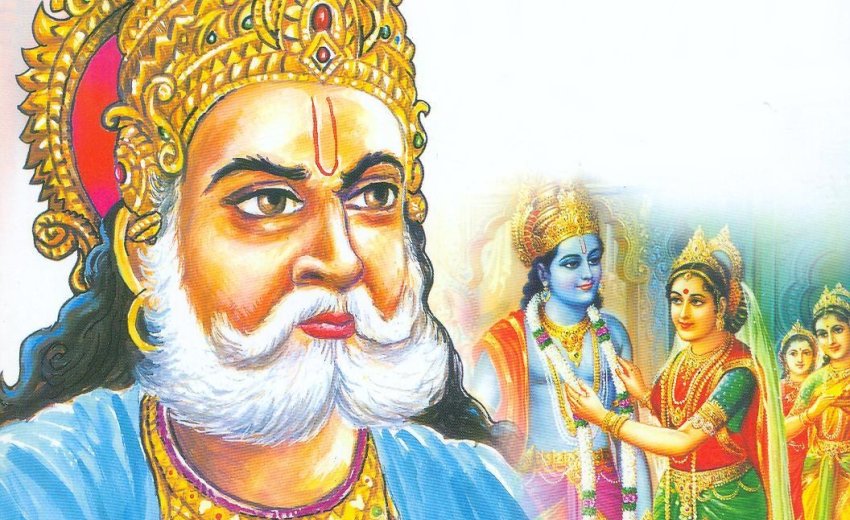
In ancient India there was a King called Janak. One day, after having eaten a filling lunch, King Janak fell asleep and dreamed he had lost a battle, his kingdom and ran for his life to a forest. Now he was hungry and was a beggar looking for food.
Extremely hungry and thirsty, he desperately approached a hut from which an old lady gave him rice & Dal (Lentils) and told him to cook his own meal. King cooked food and as he was about to eat a dog came and snatched his food and ran away.
King suddenly awoke in a sweat. He was in his quiet, serene palace, with a full stomach and servants fanning him. He was then confronted with the question of What was real? Was he a beggar, as in the nightmare, or he is a king?
With this question, King Janak assembled all of his advisors. All attempted to give an explanation, but Janak was not satisfied with any of their answers.
Then a young crooked boy Ashtavakra* entered the court and surprised everyone with the answer: “King Janaka, neither beggar nor emperor is real. You alone are real. You, yourself, are the truth. The you who was present as pure consciousness in the dream state playing the role of the beggar and who is present in the waking state playing the role of the king, this you who witnessed both these states, is your true reality.
Life during the daytime is a day-dream, during the night it is a night-dream. They are both illusions. They are filled with defects and flaws because they constantly change from one thing to another; so they cannot be real. Only you who remain unchanged in all these states are real, free of all change and illusion.”
This was also emphasized in the Gita, where Krishna pointed out the important truth that the world is constantly changing and that the atma alone is real and ever unchanging. Its emphasized by Buddha with concept of Impermanence. It is emphasized by Guru Nanak in the first shloka of the Guru Granth Sahib: Aad Sach, Jugaad Sach, Hai Bhi Sach, Hosi Bhi Sach.
Our current existence is based on a reality that is derived from the five senses (i.e. smell, sight, taste, sound, and touch - Prapanch). The environment created by our senses is perceived as real for as long as we are conscious. But when we are not conscious, such as while dreaming, our sense of reality is entirely different. During a dream, if we are chased by a wild animal, we might become frightened, but as soon as we wake up, that fear would subside, and our instinct to run away would no longer apply. This presents a profound question: which is the stronger reality?
Another version of the story:
“When Ashtavakra entered Janak Raja’s council, the advisors and the rest of the assembly started laughing upon seeing such an odd man. Ashtavakra also began laughing, but his laugh was so pure and innocent that it touched Janak Raja very deeply. Janak Raja’s advisor revealed to him that Ashtavakra was a very renowned sage, of great spiritual knowledge, and should be respectfully welcomed. After Janak Raja offered him a seat, Ashtavakra asked the king the topic of discussion. Janak replied that he originally had one question, but now there were two. First, Janak Raja asked why Ashtavakra had laughed so serenely when he had entered. Ashtavakra briefly replied, “Because you were laughing, I started laughing.” Janak Raja thought that the ascetic must not have realized that the assembly was laughing at him, and so he attempted to explain. “But these people were laughing at your strange way of walking.” Ashtavakra replied, “I took a detour from my pilgrimage into this town thinking that I would find divine people talking about the soul and God, but when I entered, none of you looked at my soul, but rather at my deformed body – you all are still living in body consciousness, and so I was wondering if I had made a mistake coming here. This was why I laughed.” Janak Raja was stunned by the sage’s understanding and quickly apologized on everyone’s behalf.
Janak Raja then explained the situation of his dream and asked the sage which existence was real? Ashtavakra’s simple response impressed the whole assembly. He told Janak Raja, “When you tried to find out which existence was more real, did you consider that both are false? Your existence as a beggar was false and temporary, and so is your time as a king. When you go to Akshardham, you will know your time here as an eighty-year dream. At that time, you will wonder, what was the purpose of coming to earth, and how much of that was really accomplished?”
“Do we all accept that what is here is like a dream and that we are really from Akshardham?” Although we walk and talk, and live our daily lives as if we will be here forever, we must realize that our lives are not permanent. (Hindu scriptures talk about seven people who are immortal, but they too die at aatyantika pralaya or at the time of total destruction. After aatyantika pralaya, only Akshardham exists.) Next, we must accept that we are visitors here, who will go to God’s Abode, which is permanent. Not accepting the reality of Akshardham (and accepting this temporary state as real) is maayaa (illusion)!”
 Singing oneness!
Singing oneness!

0 Comments